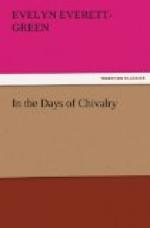“I do tell he it were but the colic,” old Andrew declared, rubbing his crumpled hands together in the glow of the fire. “He were in a rare fright when I found he — groaning out that the Black Death had hold of he, and that he were a dead man; but I told he that he was the liveliest corpse as I’d set eyes on this seventy years; and so after a bit he heartened up, and found as he could get upon his feet after all. It were naught but the colic in his inside; and he needn’t be afraid of nothing worse.”
Old Andrew proved right. William’s sudden indisposition had been but the result of fright and hard riding, followed by copious draughts of hot beer taken with a view to keeping away the contagion. Very soon he was convinced of this himself; and when he understood how the whole household had fled from him, and that the only ones who had stayed to see that he did not die alone and untended were these old souls and their adored young lady, his heart was filled with loving gratitude and devotion, and he lost no opportunity of doing her service whenever it lay in his power.
Strange and lonely indeed was the life led by those five persons shut up in that large house, right away from all sights and sounds from the world without. The silence and the solitude at last became well-nigh intolerable, and when Bridget had recovered from her attack of illness and was going about briskly again, Joan took the opportunity of speaking her mind to her fully and freely.
“Why do we remain shut up within these walls, when there is so much work to be done in the world? Bridget, thou knowest that I love not my life as some love it. Often it seems to me as though by death alone I may escape a frightful doom. All around us our fellow creatures are dying — too often alone and untended, like dogs in a ditch. Good Bridget, I have money in the house, and we have health and strength and courage; and thou art an excellent good nurse in all cases of sickness. Thou hast taught me some of thy skill, and I long to show it on behalf of these poor stricken souls, so often deserted by their nearest and dearest in the hour of their deadliest peril. If I go, wilt thou go with me? I trow that thou art a brave woman —”
“And if I were not thou wouldst shame me into bravery, Sweetheart,” answered the old woman fondly, as she looked into the earnest face of her young mistress. “I too have been thinking of the poor stricken souls. I would gladly risk the peril in such a labour of love. As old Andrew says, we can but die once. The Holy Saints will surely look kindly upon those who die at their post, striving to do as they would have done had they been here with us upon earth.”




